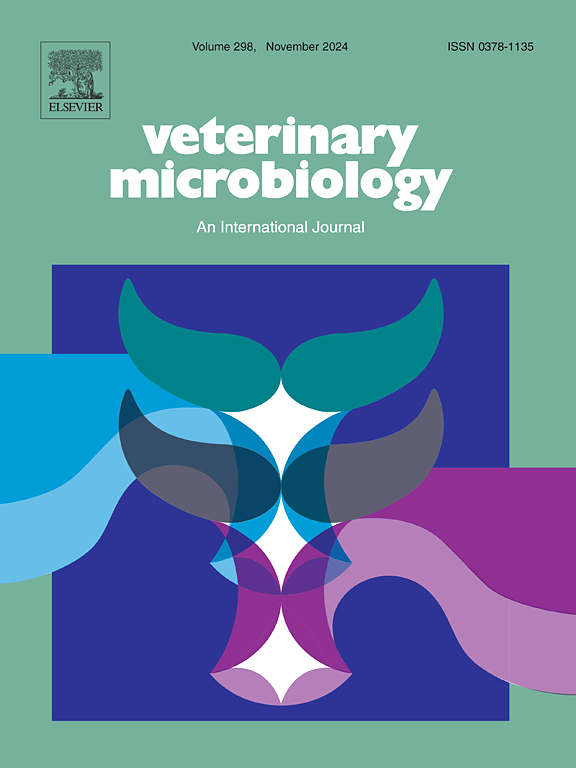Genetic Characteristics and Pathogenicity of Variant Porcine Parvovirus 1 in Northern China
IF 2.4
2区 农林科学
Q3 MICROBIOLOGY
引用次数: 0
Abstract
Porcine parvovirus type 1 (PPV1) can lead to reproductive disorders in pregnant sows, including stillbirth, mummification, embryonic death, and infertility (SMEDI syndrome). In this study, we isolated and identified 10 PPV1 strains in northern China, with genomes around 5 kb long and minor deletions in the 127-nt repeat region. The sequence analysis results showed that compared with strain NADL-2 (Reference strain), eight amino acid substitutions on the NS1 protein and fourteen amino acid substitutions on the VP2 protein were found in the ten isolates. Because the JX strain exhibited reduced neutralizing activity induced by commercially available vaccines in vitro, it was selected for challenge experiments in sows at 35 days of gestation. Mutant strain JX not only caused viremia, but also mild edema and mild inflammation in the trachea, lungs, lymph nodes, reproductive organs, and some intestines of the pregnant sows. Strain JX also caused fetal congestion and organ infection after penetrating the placental barrier. In conclusion, this study focused on the variation and evolution of PPV1 in northern China, screened a strain with reduced neutralizing activity, and determined that it has a certain degree of pathogenicity.
华北地区变异猪细小病毒 1 型的遗传特征和致病性
猪细小病毒 1 型(PPV1)可导致妊娠母猪繁殖障碍,包括死胎、木乃伊化、胚胎死亡和不孕(SMEDI 综合征)。本研究在中国北方分离并鉴定了10株PPV1病毒,其基因组长约5 kb,在127-nt重复区有轻微缺失。序列分析结果显示,与NADL-2株(参考株)相比,这10株分离株的NS1蛋白有8个氨基酸替换,VP2蛋白有14个氨基酸替换。由于 JX 株在体外接种市售疫苗后中和活性降低,因此被选中在妊娠 35 天的母猪身上进行挑战实验。变异株 JX 不仅会引起病毒血症,还会导致怀孕母猪的气管、肺部、淋巴结、生殖器官和部分肠道出现轻度水肿和轻度炎症。JX 株在穿透胎盘屏障后还会引起胎儿充血和器官感染。总之,本研究关注了 PPV1 在中国北方的变异和进化,筛选出一株中和活性降低的毒株,并确定其具有一定的致病性。
本文章由计算机程序翻译,如有差异,请以英文原文为准。
求助全文
约1分钟内获得全文
求助全文
来源期刊

Veterinary microbiology
农林科学-兽医学
CiteScore
5.90
自引率
6.10%
发文量
221
审稿时长
52 days
期刊介绍:
Veterinary Microbiology is concerned with microbial (bacterial, fungal, viral) diseases of domesticated vertebrate animals (livestock, companion animals, fur-bearing animals, game, poultry, fish) that supply food, other useful products or companionship. In addition, Microbial diseases of wild animals living in captivity, or as members of the feral fauna will also be considered if the infections are of interest because of their interrelation with humans (zoonoses) and/or domestic animals. Studies of antimicrobial resistance are also included, provided that the results represent a substantial advance in knowledge. Authors are strongly encouraged to read - prior to submission - the Editorials (''Scope or cope'' and ''Scope or cope II'') published previously in the journal. The Editors reserve the right to suggest submission to another journal for those papers which they feel would be more appropriate for consideration by that journal.
Original research papers of high quality and novelty on aspects of control, host response, molecular biology, pathogenesis, prevention, and treatment of microbial diseases of animals are published. Papers dealing primarily with immunology, epidemiology, molecular biology and antiviral or microbial agents will only be considered if they demonstrate a clear impact on a disease. Papers focusing solely on diagnostic techniques (such as another PCR protocol or ELISA) will not be published - focus should be on a microorganism and not on a particular technique. Papers only reporting microbial sequences, transcriptomics data, or proteomics data will not be considered unless the results represent a substantial advance in knowledge.
Drug trial papers will be considered if they have general application or significance. Papers on the identification of microorganisms will also be considered, but detailed taxonomic studies do not fall within the scope of the journal. Case reports will not be published, unless they have general application or contain novel aspects. Papers of geographically limited interest, which repeat what had been established elsewhere will not be considered. The readership of the journal is global.
 求助内容:
求助内容: 应助结果提醒方式:
应助结果提醒方式:


